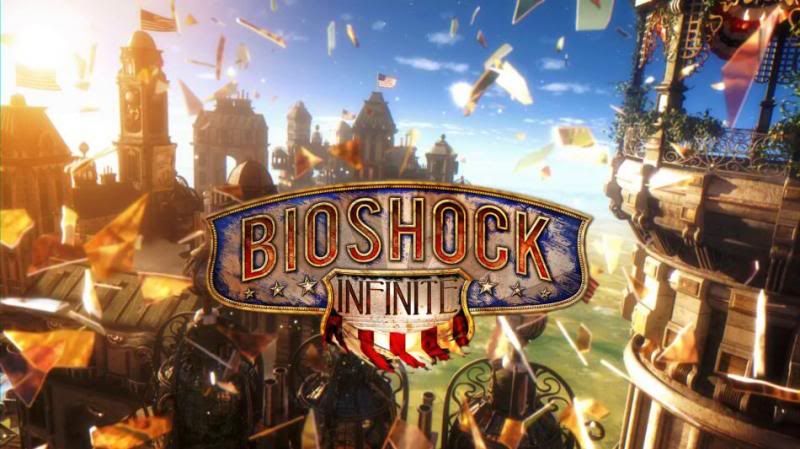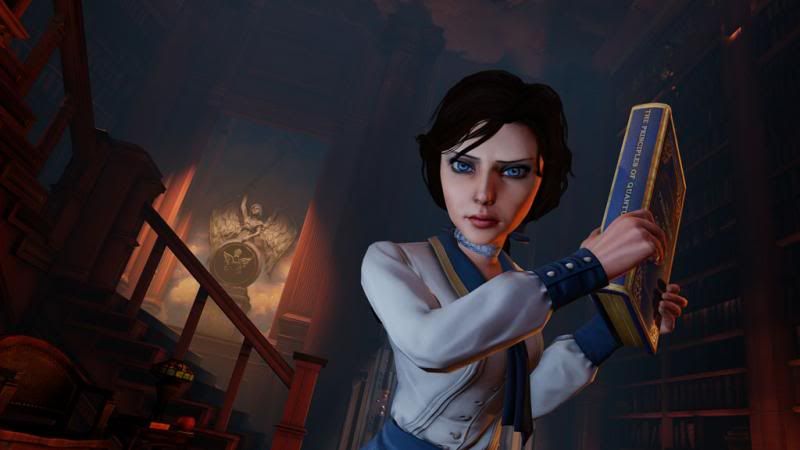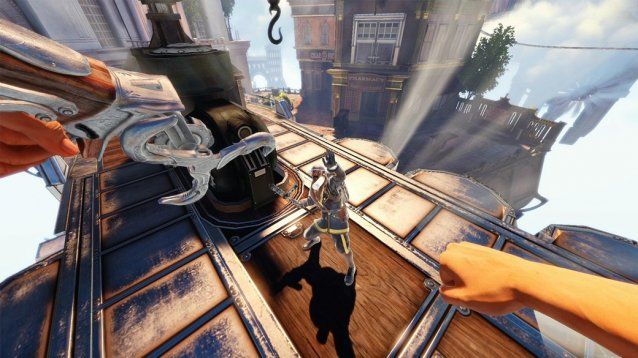It’s worth noting that BioShock was one of the very first video games I reviewed. It’s clear that in those days I was still learning the ropes and refining opinions, however, as my review of BioShock 2 ended up being overly generous. If I had the inclination, I would go back to the entry and edit in a couple more things that I’ve realized I didn’t like, but that’s old ground that’s been tread several times. Let’s just leave it at this: until now, BioShock did not have a worthy sequel. It had a map pack and some skins and a multiplayer mode, bundled and sold as a game. BioShock Infinite is the actual sequel to the first BioShock game, and it has a lot to live up to. It’s not every day that a gaming franchise gets a saving throw.

The year is 1912, and we find ourselves portraying hard-bitten private detective Booker DeWitt. A veteran of the infamous 7th cavalry and a former Pinkerton agent, Booker’s a little down on his luck, having racked up some debts from gambling. He is given a mysterious offer: “Bring us the girl, and wipe away the debt.” The girl, according to the box on his lap as he is taken to the lighthouse, is Elizabeth, a tower-bound prisoner in the airborne city-state of Columbia. At first, the city seems peaceful and prosperous, even if the citizens worshiping the founding fathers of the United States is a bit off-putting. Soon, however, DeWitt is on the run from the constabulary, who are admonished by their leader and patron saint, Z.H. Comstock or “the Prophet”, to destroy the “False Shepherd” DeWitt before he can lead “the Lamb,” Elizabeth, astray.
The games of Ken Levine have always had evocative environments, and BioShock Infinite is no exception. Columbia joins the underwater metropolis of Rapture and the corridors of the Von Braun in creating a living, breathing place with its own unique atmosphere. However, instead of the harrowing sci-fi horror of the first game or the objectivist utopia gone wrong of the second, BioShock Infinite turns a glass on history rather than literature or a genre. Specifically, Columbia invokes the so-called American exceptionalism of the turn of the 20th century. Much like the pundits of FOX News and other conservatives, the people of this time believed that they were the rightful heirs of a nation of immigrants and disparate peoples, which of course meant it was unfit for immigrants and disparate peoples. To the game’s credit, things like jingoism, racism, and sexism are handled in a largely subtle fashion, simply presented as they were or would have been in 1912 rather than dwelling on our modern views on the matter, and does not allow any pontification get in the way of the story of Booker and Elizabeth.

“Um… Miss? I really hope that book isn’t loaded…”
Perhaps the strongest part of the game is that story, which I will not spoil here. There was some controversy before the game’s release concerning the decision to put Booker front and center instead of Elizabeth, and now that I’ve played it, I can say that I agree with those who think Elizabeth deserves her place on the front cover. She’s a well-rounded, interesting, strong, and engaging character. It was conjectured by some that the bulk of the game consisting of a glorified escort quest would make the game dull or uninteresting. As much as there are some flaws in the gameplay, Elizabeth’s role is not one of them. Not only is her ability to open rifts between parallel universes crucial to the plot, she can assist in combat by pulling in cover, turrets, and items when you find the right rift. In addition, she will occasionally find money, health, ammunition, or Salt (which powers your Plasmids Vigors) in the middle of a firefight. Finally, she will point out if some enemies have specific weapons so you can prioritize. Outside of combat, as you explore Columbia, Elizabeth and Booker will converse, banter, and even argue. Their conversations feel natural and spontaneous for the most part, which is a credit to the writers and voice actors. I often found myself frustrated with a shooting section because I wanted to spend more time with these two rather than shooting at dudes.
BioShock Infinite is not perfect, and its biggest flaw may be the shooting at the core of the game. While the guns function well, there’s very little skill involved in it. Much like its previous games, this BioShock focuses less on the building of your character’s abilities and more on what the character does between combat sequences. One of the things that really bothered me is that Booker is limited to two guns, while all eight Vigors are always available once discovered. There aren’t that many tactical decisions to make, and between the pushover human enemies to the Handyman encounters that make the Big Daddies look like rather friendly folks, not a great deal of variety. It doesn’t completely derail things, and the Skyhook’s ability to zip you around the gallery rather than confining you to cover helps quite a bit, but it does keep BioShock Infinite from reaching its full potential as a gaming experience. As good as the story is, the player’s interaction with it is somewhat minimal. No significant decisions are made, and the outcome of the game cannot be changed. As worthy as the destination is of the journey, I feel like an opportunity was missed in favor of rendering the Automated Patriots, which are probably the most fun enemies to fight. But I digress.

Gives new meaning to the term “rail shooter”.
Stuff I Liked: The weapons had a good, turn-of-the-century look and feel about them. I like that audio logs, environmental messages on the walls, and open non-linear level design remain a part of this gaming series. The presentation of the Vigors is very good. The combat can be satisfying at times, especially when the Skyhook gets involved, but…
Stuff I Didn’t Like: I felt hamstrung because I was limited to two weapons. There are portions later in the game where it felt like an incredible liability. As good as the story was, more could have been done to make the player feel included in the experience, rather than simply being an observer. That said…
Stuff I Loved: The story IS well-presented, paced decently, and ends in a very satisfactory manner. The character of Elizabeth is fantastic. Booker adds a great deal of personality by not being a silent protagonist. I adore the British twins. The music is great, the graphics are beautiful, and the city of Columbia invokes curiosity and fascination as you explore.
Bottom Line: Despite its flaws, BioShock Infinite is an extremely good game. Few games present their stories with this much humanity, pathos, and personality. The world is very well-realized and encourages you to spend time there. While the combat isn’t great, it does have some interesting bits to offer, and it provides the promise of a universe where BioShock 2 never existed.



Leave a Reply